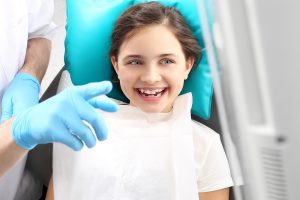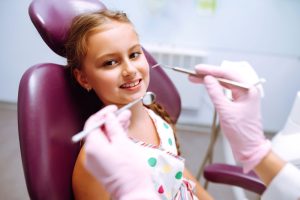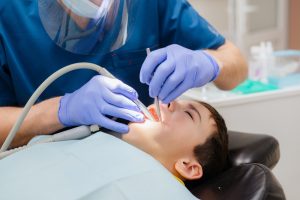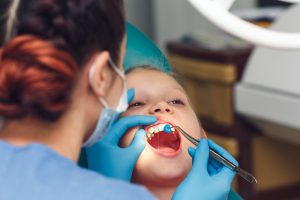Building Healthy Habits for Life at Pristine Dental
 Pediatric dental exams and cleanings at Pristine Dental are specifically designed for children’s unique needs, differing significantly from adult dental procedures in technique, duration, and approach.
Pediatric dental exams and cleanings at Pristine Dental are specifically designed for children’s unique needs, differing significantly from adult dental procedures in technique, duration, and approach.
Our child-centered approach recognizes that young patients have shorter attention spans, different comfort needs, and developing teeth that require specialized care techniques. Unlike adult cleanings that focus primarily on maintenance, pediatric cleanings emphasize education, habit formation, and gentle introduction to lifelong oral health practices.
Ready to give your child a positive dental experience? Call Pristine Dental at (480) 935-2424 today to schedule your child’s examination and cleaning with our family dentist near you. Serving families from Paradise Valley, Fountain Hills, and Phoenix with gentle pediatric care that makes children smile.
Flexible Scheduling for Busy Scottsdale Lives
In a city like Scottsdale, where schedules run as fast as the executives who live here, Pristine Dental’s unique extended hours and same-day emergency slots are a game-changer, reflecting their deep understanding of modern patient needs. Open early at 7 AM for morning routines, late until 7 PM for after-work visits, and Saturdays for family weekends, the practice ensures dental care fits seamlessly into your life—whether it’s a sudden Phoenix-area crisis or a planned Chandler check-up. This flexibility stems from their family-owned ethos, prioritizing accessibility over rigid calendars.
What elevates this offering is the blend with expertise: urgent care is handled by board-certified pros like Dr. Cooper, who can address dental implants or extractions on the spot without compromising quality. Patients select Pristine for the peace of mind that comes from knowing help is always available, reducing stress and preventing minor issues from escalating into costly emergencies.
What Are Pediatric Dental Exams and Cleanings?
Pediatric dental exams and cleanings are comprehensive oral health assessments and preventive treatments specifically designed for children’s developmental needs, addressing the unique characteristics of primary teeth, mixed dentition periods, and growing oral structures. These specialized procedures differ from adult cleanings in duration, technique, and educational focus.
During pediatric exams, Dr. Smith evaluates not only current oral health status but also developmental progress, tooth eruption patterns, and potential future concerns that require early intervention. The cleaning component removes plaque and tartar buildup while teaching children proper oral hygiene techniques through demonstration and practice.
The American Academy of Pediatric Dentistry emphasizes that specialized pediatric procedures are essential for optimal child oral health outcomes because children’s teeth, behavior patterns, and learning needs differ significantly from those of adult patients.
Key Differences Between Pediatric and Adult Cleanings
Understanding how pediatric dental care differs from adult procedures helps parents appreciate the specialized approach required for children’s optimal oral health:
- Appointment Duration: Pediatric cleanings typically last 30-45 minutes compared to 60-90 minutes for adults, accommodating children’s shorter attention spans and comfort limits.
- Instrument Size: Child-specific instruments are smaller and gentler than adult tools, designed for smaller mouths and more delicate tissues that require careful handling.
- Pressure and Technique: Lighter pressure and modified techniques protect developing teeth with thinner enamel and larger nerve chambers that are more sensitive than mature teeth.
- Educational Focus: Pediatric appointments emphasize learning and skill development rather than just maintenance, teaching children how to care for their teeth independently.
- Behavioral Management: Specialized communication techniques, positive reinforcement, and patience accommodate children’s developmental stages and comfort needs.
- Developmental Assessment: Pediatric exams include growth monitoring, habit evaluation, and orthodontic screenings, which don’t apply to adult patients with fully developed oral structures.
Comprehensive Pediatric Examination Process
Dr. Smith’s thorough examination approach addresses all aspects of children’s oral health and development:
 Medical History Review: Discussion of your child’s health history, medications, and any concerns you’ve noticed about their teeth or oral habits.
Medical History Review: Discussion of your child’s health history, medications, and any concerns you’ve noticed about their teeth or oral habits.- Visual Inspection: Gentle examination of teeth, gums, and oral tissues using child-appropriate lighting and magnification to identify any concerns.
- Developmental Assessment: Monitoring of tooth eruption patterns, jaw development, and bite relationships to identify potential future orthodontic needs.
- Digital X-rays When Needed: Low-radiation imaging to detect cavities between teeth and monitor developing permanent teeth beneath the gumline.
- Oral Habit Evaluation: Assessment of thumb-sucking, pacifier use, or other habits that could affect dental development and recommendations for modification when necessary.
- Growth Monitoring: Evaluation of facial growth patterns and jaw development to identify potential issues requiring early intervention.
- Parent Consultation: Discussion of findings, home care recommendations, and answers to any questions about your child’s oral health development.
- Treatment Planning: Development of preventive care plans and scheduling recommendations based on your child’s individual needs and risk factors.
Gentle Pediatric Cleaning Procedures
 Pediatric dental cleanings use specialized techniques that differ significantly from adult procedures:
Pediatric dental cleanings use specialized techniques that differ significantly from adult procedures:
Age-Appropriate Cleaning Techniques
For toddlers and young children, cleanings focus on gentle plaque removal using soft brushes and mild polishing paste that won’t overwhelm sensitive teeth or frighten young patients. Dr. Smith introduces cleaning instruments gradually, explaining each step in child-friendly language that reduces anxiety.
Older children receive more thorough cleanings similar to adult procedures, but with continued emphasis on education and demonstration. The cleaning process becomes a learning opportunity where children practice brushing techniques on models before receiving professional cleaning.
Educational Component Integration
Unlike adult cleanings that assume established oral hygiene knowledge, pediatric cleanings include extensive education about proper brushing angles, flossing techniques, and the importance of regular oral care. Dr. Smith demonstrates techniques using oversized toothbrushes and models that help children visualize proper care methods.
Children receive personalized instruction based on their current skill level and areas where improvement is needed, with take-home materials that reinforce learning between appointments.
Age-Specific Examination and Cleaning Approaches
Different ages require different approaches to maximize comfort and effectiveness:
Toddlers (Ages 1-3)
First cleanings are very gentle and brief, focusing on acclimatization rather than thorough cleaning. Dr. Smith uses finger brushes or very soft toothbrushes with minimal polishing paste, making the experience positive and non-threatening.
Examinations at this age focus on counting teeth, checking for early signs of decay, and educating parents about proper home care routines for developing teeth.
Preschoolers (Ages 3-5)
Cleanings become more thorough as children develop greater tolerance and cooperation. Dr. Smith introduces standard cleaning instruments gradually while maintaining a playful, educational atmosphere that keeps children engaged.
Examinations include more detailed assessments of tooth development, early orthodontic screening, and evaluation of oral habits that could affect future dental health.
School Age (Ages 6-12)
Cleanings approach adult thoroughness while maintaining child-friendly communication and educational focus. Dr. Smith addresses the unique challenges of mixed dentition periods when both primary and permanent teeth are present.
Examinations during this period emphasize monitoring permanent tooth eruption, sealant recommendations, and orthodontic evaluation as facial growth progresses.
Preventive Treatments During Pediatric Visits
Pediatric cleaning appointments often include additional preventive treatments:
Fluoride Applications
 Professional fluoride treatments provide enhanced cavity protection for developing teeth. Unlike adult applications that are routine, pediatric fluoride treatments are often flavored and applied using fun delivery methods that children enjoy.
Professional fluoride treatments provide enhanced cavity protection for developing teeth. Unlike adult applications that are routine, pediatric fluoride treatments are often flavored and applied using fun delivery methods that children enjoy.
Dr. Smith evaluates each child’s cavity risk and fluoride needs individually, recommending treatments based on diet, oral hygiene effectiveness, and community water fluoridation levels.
Dental Sealant Placement
When appropriate, dental sealants can be placed during cleaning appointments to protect permanent molars from cavities. The application process is explained in child-friendly terms and completed quickly to maintain children’s attention and cooperation.
Sealant placement timing depends on individual tooth eruption patterns and cavity risk assessment that Dr. Smith performs during regular examinations.
Oral Hygiene Instruction
Every pediatric cleaning includes personalized oral hygiene instruction that addresses each child’s current skill level and areas needing improvement. Children practice new techniques during the appointment with immediate feedback and encouragement.
Parents receive guidance about supervising home care routines and age-appropriate expectations for children’s developing independence in oral health maintenance.
Benefits of Specialized Pediatric Dental Care
Professional pediatric exams and cleanings provide advantages that extend beyond simple tooth cleaning:
- Cavity Prevention: Professional cleaning removes plaque buildup that children often miss during home care, significantly reducing cavity risk in developing teeth.
- Early Problem Detection: Regular examinations identify potential issues when they’re easiest and least expensive to treat, preventing complex problems later.
- Habit Formation: Educational components help children develop proper oral hygiene techniques and positive attitudes toward dental care that last a lifetime.
- Growth Monitoring: Developmental assessments identify orthodontic or growth concerns early when intervention is most effective and less costly.
- Anxiety Reduction: Positive pediatric experiences eliminate dental fear and create confident patients who continue regular care into adulthood.
- Parent Education: Guidance about home care routines, dietary recommendations, and developmental expectations supports optimal oral health between visits.
- Professional Fluoride Protection: Specialized fluoride treatments provide enhanced cavity protection during the most vulnerable developmental periods.
- Customized Care Plans: Individual assessment allows for personalized preventive recommendations based on each child’s specific needs and risk factors.